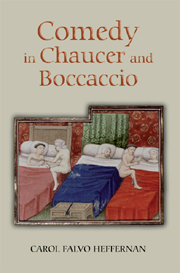Book contents
- Frontmatter
- Contents
- In memory Of Thomas Farel Heffernan 1933–2009
- Preface and Acknowledgments
- 1 Introductory matters
- 2 The Comic Inheritance of Boccaccio and Chaucer
- 3 Parallel Comic Tales in the Decameron and the Canterbury Tales
- 4 Antifraternal Satire in Boccaccio and Chaucer
- 5 Adding Comedy: Boccaccio's Filostrato and Chaucer's Troilus and Criseyde
- Conclusion
- Bibliography
- Index
- Chaucer Studies
4 - Antifraternal Satire in Boccaccio and Chaucer
Published online by Cambridge University Press: 12 September 2012
- Frontmatter
- Contents
- In memory Of Thomas Farel Heffernan 1933–2009
- Preface and Acknowledgments
- 1 Introductory matters
- 2 The Comic Inheritance of Boccaccio and Chaucer
- 3 Parallel Comic Tales in the Decameron and the Canterbury Tales
- 4 Antifraternal Satire in Boccaccio and Chaucer
- 5 Adding Comedy: Boccaccio's Filostrato and Chaucer's Troilus and Criseyde
- Conclusion
- Bibliography
- Index
- Chaucer Studies
Summary
Satiric representation of friars is a particular form of anticlericalism found in both Boccaccio's Decameron and Chaucer's Canterbury Tales. Friars play principal roles in eight tales of the Decameron (Decameron 1, 1; 1, 6; 3, 3; 3, 4; 3, 7; 4, 2; 7, 1; 7, 3). Chaucer's portrait of the corrupt Friar Hubert is the longest of all the pilgrim descriptions in the General Prologue. moreover, Friar John of the Summoner's Tale as well as Friar Hubert's own tale (against which the Summoner retaliates with his about a friar) sustain the satirical antifraternal tone of Friar Hubert's portrait. Preoccupation with the faults of the mendicant orders in Boccaccio and Chaucer reflects a general fascination with antifraternalism in late medieval vernacular literature.
Friction broke out between the secular clergy of the Church and the regular orders – friars were “regulars” because they lived by a “rule” or regula – when the mendicant fraternal orders were granted Papal recognition in the thirteenth century. The Black Friars, followers of St. Dominic (recognized in 1216), the Grey Friars of the Franciscan order (approved in 1223), the White Friars or Carmelites (given Papal approval in 1226), and the Augustinians (recognized in 1256) all represented threats to the parish priest because they had been given the right by the Pope to hear confessions, bury the dead, and to preach. The thirteenth-century controversies between the secular clergy and fraternal orders at the University of Paris, fueled by the polemics of the Professor of Theology, William of St. Amour, are the source of a long tradition of attacks on friars.
- Type
- Chapter
- Information
- Comedy in Chaucer and Boccaccio , pp. 72 - 100Publisher: Boydell & BrewerPrint publication year: 2009



